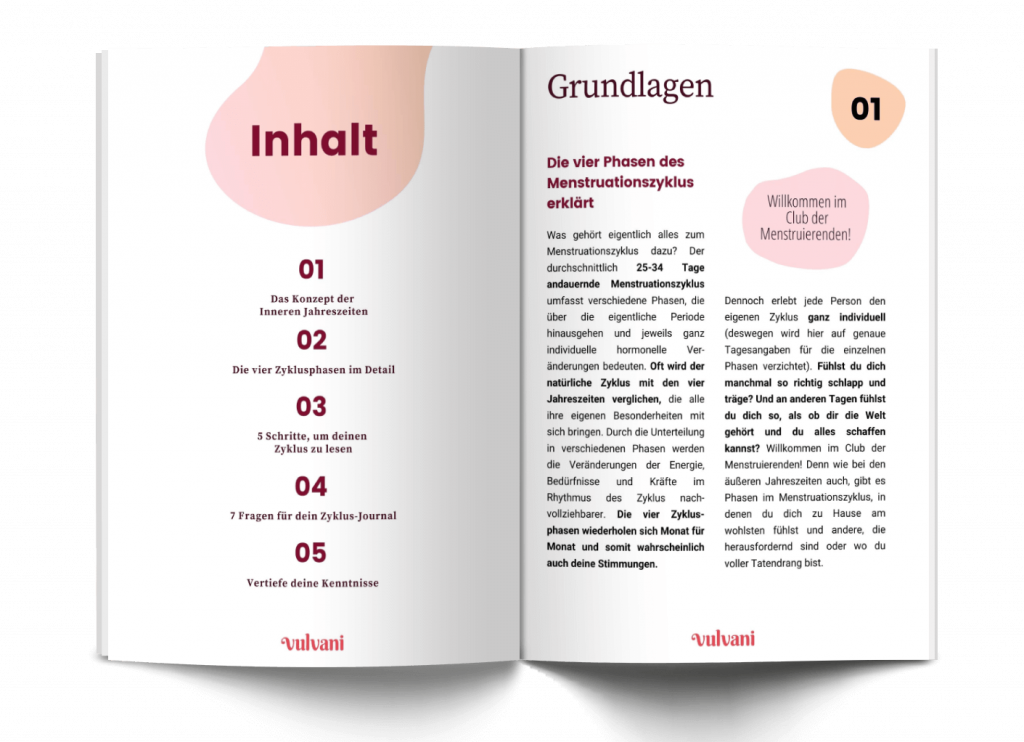
Discovering your menstruation as a spiritual practice
Yasmine understands her menstruation as a spiritual practice and shares in this interview how she is connecting more with her own body through cycle awareness.

Missing periods, heavy bleeding or altered lengths of the menstrual cycle? Menstruating people reported all this after their Covid-19 vaccinations. But a new study gives the green light: the COVID vaccination can indeed influence the menstrual cycle; but only minimally and everything remains within the normal range.
The effects of the COVID vaccination have been a cause for concern since the vaccination campaign began. In addition to several different follow-up questions, there has been increased concern that COVID vaccination can affect menstruation. Vaccinated menstruators, for instance, reported changes in their cycles and periods after vaccination. So, let’s take a closer look!
At the end of July 2021, the Paul Ehrlich Institute (performs inspections during vaccine development and for market approval in Germany) had given the all-clear after reports of irregularities in menstrual cycles and ruled out a risk: “Based on spontaneous reports and taking into account the vaccination rate, no risk signal is currently seen.” This is now followed by a recently published study in the journal Obstetrics & Gynecology. In it, the association between menstrual cycle length and coronavirus disease 2019 vaccination was examined.
The researchers used the Natural Cycles app to study U.S. women between the ages of 18-45 with normal cycle lengths (24-38 days) from October 2020 to September 2021. Two groups were analysed here: Vaccinated and unvaccinated. For the vaccinated group, three consecutive cycles before the first vaccine dose, followed by three cycles with vaccine dose were analysed. This group was vaccinated with Pfizer-BioNTech (55 %), Moderna (35 %), and Johnson & Johnson/Janssen (7 %). Over a similar time period, six cycles were looked at more closely in the unvaccinated group. In the data set of 3,959 individuals (2,403 vaccinated; 1,556 unvaccinated), changes in cycle and menstrual length could then be calculated.
In general, the vaccinated and unvaccinated groups had only differing cycle lengths of less than one day (dose 1: 0.64 days; dose 2: 0.79 days), with no significant difference. Within a few months, these changes began to level off. Thus, there is no association of vaccination with changes in menstrual duration. Also of interest, 358 individuals received both doses of vaccine within a single cycle. These vaccinated individuals had a longer cycle (by about two days) in the two following months. In their study, Edelmann et al. state, “Although approximately 10% of these individuals experienced a clinically notable change in cycle length of 8 days or more, this change attenuated quickly within two postvaccine cycles.”
In a Norwegian study on the occurrence of menstrual disorders after COVID-19 vaccination, 18- to 30-year-old menstruating women were interviewed using a cell phone survey. The study of 5,688 menstruating participants confirmed that menstrual irregularities occur independently of vaccination. Even before the COVID vaccination, 38 % of the participants reported irregularities with their menstruation. As in the US study, the researchers found an increase in menstrual irregularities after vaccination: heavier bleeding than usual, longer duration, and only short intervals between menstrual periods. 39 % of respondents reported irregularities after the first dose of vaccine and 41 % after the second. They were particularly affected by heavier bleeding. Here, too, however, the symptoms settled down again after two months at the latest.
The menstrual cycle is a sign of the health and fertility of menstruating people. Menstrual cycles are not static but change from month to month, so the term “cycle” is particularly relevant here. It is controlled by the hypothalamic-pituitary-ovarian axis, which is influenced by life and environmental stressors as well as health issues. These can include: psychological stress, altered hormonal balance, or immune stress and inflammatory responses. “mRNA vaccines create a robust immune response or stressor, which could temporarily affect the hypothalamic-pituitary-ovarian axis if timed correctly,” Edelmann et al. conclude.
Menstruating individuals have a varying cycle length. This is independent of vaccination status. The US study showed that there was no significant difference in cycle length between vaccinated and unvaccinated individuals. Even so, these minimal changes in the cycle can also be explained by the stress of the pandemic, as both groups experienced an altered cycle simultaneously. In principle, this means: Do not be scared of vaccination! With COVID vaccination, there may be changes in the menstrual cycle, but these are only temporary. It is normal for the cycle to react to external influences, such as vaccination, and to change for a short time as a result. As Edelmann et al. describe it, “In contrast, an acute severe illness with or without septicemia, such as COVID-19, could be catastrophic to hypothalamic-pituitary-ovarian axis function, sometimes permanently.” In other words, illness from the virus can be more dangerous than vaccination.
Since studies and numbers can often seem quite abstract, we would also like to tell you about the personal experiences of our team:
Our co-founder Britta has been vaccinated three times against COVID, following the recommendations in Germany. Because she knows that the menstrual cycle reacts more sensitively to external influences, especially in the follicular phase (cycle phase from the start of menstruation to ovulation), she placed all three vaccination dates in the luteal phase (cycle phase from ovulation to the start of menstruation). And the plan worked for her: Her menstrual cycle and her menstruation have not changed due to the COVID vaccination. What Britta didn’t expect, however, was that at the beginning of the year she came down with COVID (she didn’t have a bad progression and is feeling great today). The surprising thing, though, was not only the positive COVID test, but that she got her period at the same time. Read more about how she managed her period and COVID at the same time and why it’s actually not a bad combination at all here.
I myself have also been vaccinated a total of three times (1st & 2nd vaccination Moderna; 3rd vaccination BioNTech) and noticed changes in my mestrual cycle length. All of my COVID vaccinations were right after my period, in my follicular phase. Before and during the vaccinations, my cycles were about 24-26 days long. However, after my first two COVID vaccinations with the Moderna vaccine, I noticed an increase in my cycle length to 32 days. By my third vaccination (January 2022), I had a cycle length of 28-32 days. It wasn’t until my last menstrual cycle and third COVID vaccination that my cycle had returned to its normal length of 25 days. So, my menstrual cycle lengthened, but also returned to normal, as the study also reported. I have not noticed any change during my period.
Want to share your own experiences with side effects? Check out the SafeVac 2.0 app (only in German), which conducts a survey of COVID-19 vaccine tolerability. We also look forward to hearing about your personal experiences in the comments.



Yasmine understands her menstruation as a spiritual practice and shares in this interview how she is connecting more with her own body through cycle awareness.

What options are there for male birth control? Ailsa delivers an overview of what is available now, and what may come in the future.

Sustainable underwear? The founders of TUKEA talk about fair labour conditions, body diversity and body literacy.
…and empower countless women to make empowered choices about their bodies!

